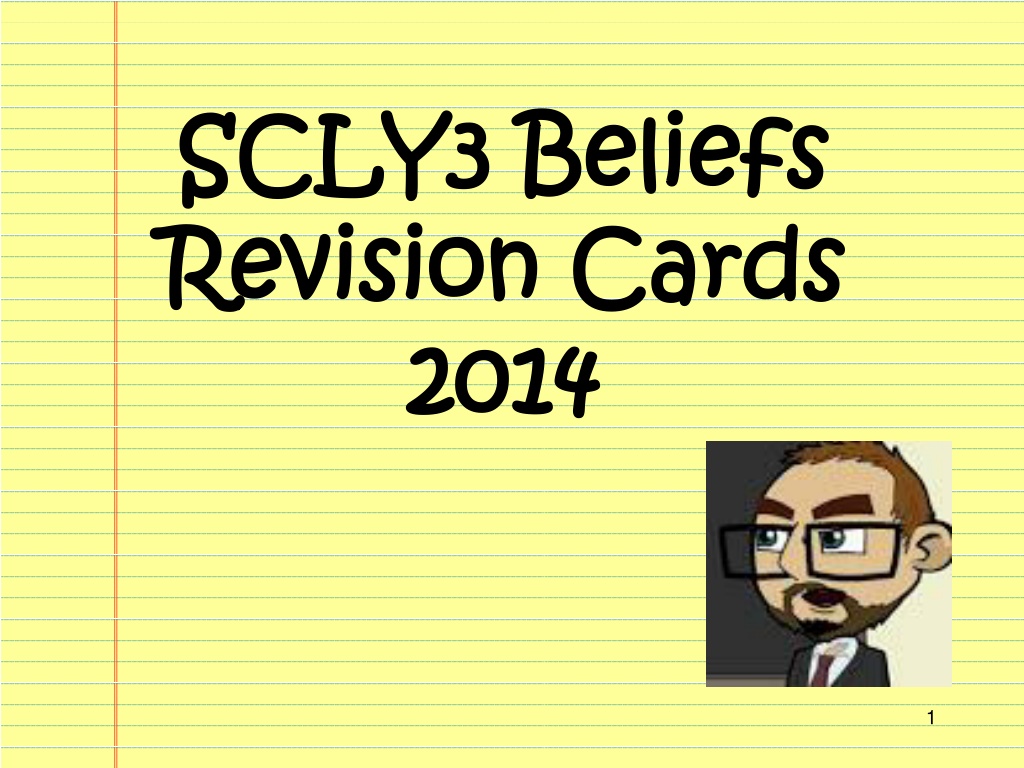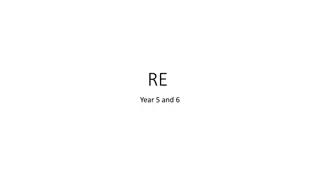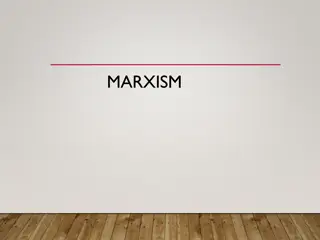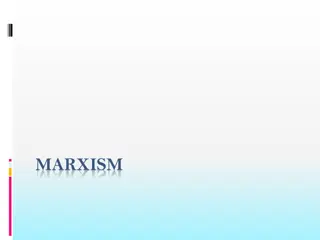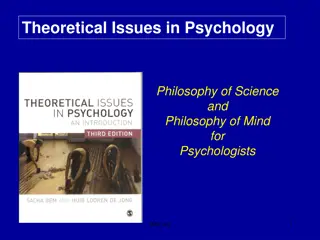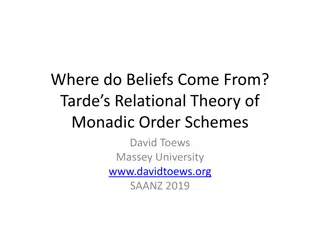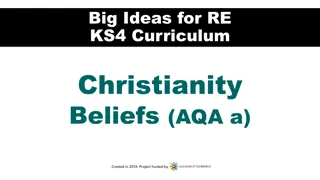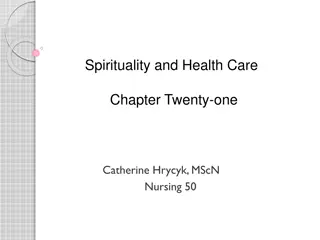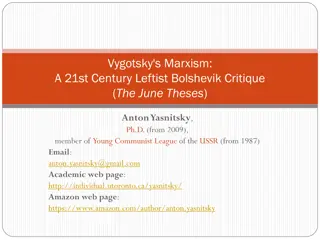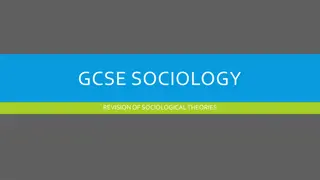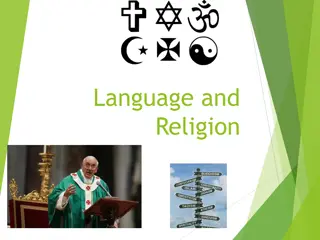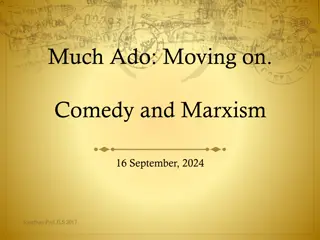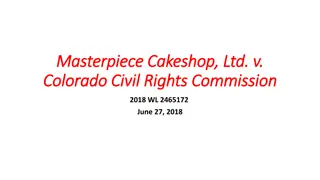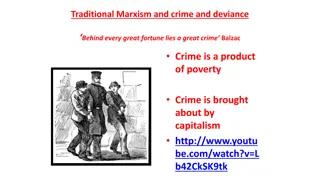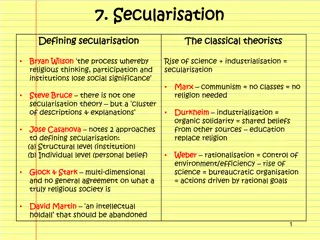Exploring Religious Beliefs and Social Dynamics in SCLY3: Functionalism vs. Marxism
Delve into the intricate relationship between religious beliefs and social change or stability through the contrasting lenses of Functionalism and Marxism. Unpack the mechanisms by which belief systems impact societal structures and the dynamics of change or preservation. Gain insight into how these contrasting perspectives influence our understanding of the complex interplay between religion and society.
Uploaded on Sep 09, 2024 | 1 Views
Download Presentation

Please find below an Image/Link to download the presentation.
The content on the website is provided AS IS for your information and personal use only. It may not be sold, licensed, or shared on other websites without obtaining consent from the author. Download presentation by click this link. If you encounter any issues during the download, it is possible that the publisher has removed the file from their server.
E N D
Presentation Transcript
SCLY3 Beliefs SCLY3 Beliefs Revision Cards Revision Cards 2014 2014 1
The specification at a glance The specification at a glance Relationship between religious belief and social change and stability Functionalism Marxism Weber Neo-Marxism Feminism Fundamentalism NRMs and NAMs Religious organisations and their relationship to religious spiritual belief and practice Types of religious organisation (church, denomination, sects, cults) The relationship between different social groups and religious organisations, beliefs and practices Reasons why people join NRMs etc Gender and religion Ethnicity and religion Social class and religion Age and religion (compare each) The significance of religion and religiosity in the contemporary world, including secularisation in a global context Globalisation Fundamentalism Postmodernism Secularisation (ways of defining/measuring + arguments for/against). Different theories of ideology, science and religion Theories of ideology Science as a belief system Links to role of religion theories 3
Contents Contents 1. 2. 3. 4. 5. 6. 7. 8. 9. 10. Secularisation Role of Religion Religion and Social Change Religious organisations (incl. NRMs etc) Gender and religion Ethnicity and religion Age and religion Social Class and religion Postmodernism/globalisation Ideology and Science 4
1. Role of Religion 1. Role of Religion Positive functions Positive functions Negative functions Negative functions Functionalist Functionalist Maintains value consensus Social integration social glue Source of identity Maintains social order stability = prevents change Cope with uncertainty and life crisis Marxist Marxist Maintain capitalism Legitimation of authority Transmission of ruling class ideology Compensation A form of alienation Social control Feminism Feminism Supporting patriarchy Maintaining traditional roles New Right New Right Promote moral values 5
Studies Studies Evaluation Evaluation Functionalist Functionalist Durkheim Durkheim Totemism = identity/values Collective worship - Social glue Shared rituals = The collective conscience and integration Sacred and profane Pluralism shared values? Only relevant to small-scale societies Religion can cause conflict and divide people Secularisation = less important Privatisation of religion believing without belonging Bellah Bellah Civil religion National identity (Americanism) Malinowski Malinowski Explain the unexplained Help cope with uncertainty Reduce tension in life crises Rites of passage/rituals Other sources of comfort today Parsons Parsons Core values/central value system Reinforce and promote norms Generalisation Prevents anomie (life crises) People not regulated by morality any more Religion as a source of harmony/stability Religion can cause social change/conflict 6
Studies Studies Evaluation Evaluation Religion is only an opium if people believe it Secularisation = less belief Religion can support the oppressed = revolution Socialist countries still religious Where did religion come from? Benefits of religion (ie, funerals/hope) Marxist Marxist Karl Karl Marx Marx Religion promotes dominant ideology Opium of the people eases the pains of oppression Religion legitimating the power of the ruling class Social control hell as punishment Budd Budd Victorian capitalism Protestantism encouraging hard work/please God Lenin Lenin Spiritual gin Leach Leach CofE Bishops = 80% public school CofE = Tory party at prayer Social Control Legitimation Ideology Compensation Religion as a source of compensation Bliss in the after life Supernatural intervention Explains/justifies inequality Virtue of suffering 7
Examples of religion Examples of religion supporting capitalism supporting capitalism MARXIST VIEW Examples Examples of religions of religions Impact Impact Divine Divine Right of Kings Right of Kings Legitimate hierarchy and obedience, punishment if not conform Hindu Caste System Hindu Caste System Legitimation and social control reproduce social inequality All things bright and beautiful All things bright and beautiful Legitimation of class differences Victorian Victorian protestantism protestantism Work hard or displease God Slavery and Christianity Slavery and Christianity Compensation afterlife - bliss Correspondence principle 8
Studies/examples Studies/examples Evaluation Evaluation Neo Neo- -Marxists Marxists Gramsci Gramsci Counter-hegemony Organic intellectuals (examples of religion as a form of resistance) Maduro Maduro Liberation theology Latin America Catholic priests fighting dictatorship and defending the poor Pope disproved of these priests and advised them to stop Iran 1979 Iran 1979 Islamic revolution led by Ayatollah Khomeini against the western Shah of Iran Was this conservative reactionary? Martin Luther King Martin Luther King Jr Black civil rights movement Agape love all equally Jr Not really encouraged revolutions just minor changes Methodism & Labour Party Methodism & Labour Party Worker s rights/equality Jesus love thy neighbour, help the needy 9
Studies Studies Evaluation Evaluation Religious organisations Religious organisations Karen Armstrong/Woodhead exclusion from priesthood Male domination/abuse in sects Woodhead Woodhead forms of religious feminism- gain status Veil = symbol against oppression Feminist Feminist Places of worship Places of worship Segregation Restricted involvement Holm devaluation of women El El Sadawi Sadawi religion is not problem only men hijacking organised religion Sacred texts Sacred texts Stereotypes/gender roles Expectations (Mother Mary , Eve, Delilah ) Qur an men in charge of women Holm & Holm & Bowker of feminist movement (orgs led by women) Bowker forerunner Religious laws/customs Religious laws/customs Fewer rights for women Genital mutilation/veiling ( mobile prison Burchill) Domestic/reproductive expectations Sexual expectations (marriage/virgin) Daly male/sado rituals High levels of female religiosity Women and NAMs Female priests now Fundamentalism offers protection/respect Women rabbis since 1972 Quakerism fair Simone de Beauvoir compensation Anderson & Gordon witchcraft Armstrong decline of the Goddess 10
2 2. Religion & Social Change . Religion & Social Change Religion Religion Preventing Change Preventing Change Functionalism Functionalism Maintain social order Legitimates power and authority of ruling class Marxist Marxist Others Others Feminism Feminism Maintains patriarchy Reinforce shared values Prevent rebellion Reinforce gender roles Source of identity Compensation Source of meaning Emotional security Fundamentalism Fundamentalism (see (see slide) slide) 11
2 2. Religion & Social Change . Religion & Social Change Fundamentalism: Conflict Fundamentalism: Conflict & Social Change Fundamentalism Fundamentalism patterns of religious militancy by which self-styled true believers attempt to arrest religious identity and create viable alternatives to secular institutions and behaviour (Almond et al) .(response to religion being watered down return to tradition/authentic religion) & Social Change Features Features Response to secularisation Distrust of other faiths/dogmatic Follow a single sacred text Examples Examples New Christian Right Al Qaeda Hamas Causes Conflict Causes Conflict Distrust/intolerant of other religions = threat to their religion Tension with other followers of their religion sell outs! Prevent social change/conservative force Prevent social change/conservative force Want to reverse social changes (moral decay) and CHANGE society (but backwards) reactionary force reactionary force Secularisation (the cause of Fundamentalism) Secularisation (the cause of Fundamentalism) - - BRUCE BRUCE Islam and the West Modernising too rapidly and ignoring needs of the poor = resentment against West Led to rise of fundamentalism Fundamentalism will grow when in societies where: There is a ready supply of followers- poor politics fails citizens no voice no central authority controlling religion followers have a common enemy (Armstrong) 12
2 2. Religion & Social Change . Religion & Social Change Religion Religion Promoting Change Promoting Change Weber Weber Protestant ethic led to rise of capitalism Protestant ethic led to rise of capitalism Neo Neo- -Marxist Marxist Antonio Gramsci Antonio Gramsci counter hegemony At war with Marx s ghost Social action theory - ideas Comparative analysis causes of industrialisation Calvinist Protestantism = ascetic The elect/ A calling Abstinence/austerity/self-discipline Make money/being frugal please God Hard work/investment Rational behaviour = efficient and industrious (time is money) a voice for the oppressed a voice for the oppressed Ernst Bloch Ernst Bloch utopia principle of hope (a vision of a better world) G G K Nelson K Nelson notes where religion is anti- establishment: US civil rights movt MLK Iran 1979 Islamic revolution Labour Party and Methodism Maduro Maduro Liberation Theology Poland 1980s Solidarity movement Levellers/diggers = early Trades Unions Evaluation Evaluation Calvinism = against wealth creation Some Calvinist nations = slow develop Industry before Calvinism (Kautsky) Exclusionism = motive to survive More recently More recently 9/11 = impact on US foreign policy (2001) US militant militia bombings in Oklahoma (1995) Christian Fundamentalist 13
2 2. Religion & Social Change . Religion & Social Change Other Other considerations considerations force Conservative Conservative force Cultural defence Cultural defence (Bruce) Social Social change change Religion and conflict Religion and conflict Protestants & Catholics Israelis and Palestinians Catholics and Muslims in Bosnia Taliban in Afghanistan Taliban in Afghanistan ultra conservative- defending traditional values (reactionary) More recently More recently 9/11 = impact on US foreign policy (2001) US militant militia bombings in Oklahoma (1995) Christian Fundamentalist Postmodernity and uncertainty make religions certainties attractive Most religions are conservative where moral issues moral issues are concerned reinforce family values McGuire McGuire factors for a religion causing change: Strong moral code followers critical of soc. Religious beliefs are central to culture Religious orgs play role in politics/economics New Christian Right New Christian Right (Bruce): Politically/Morally conservative in USA Anti-abortion/homosexuality/divorce/welfare Traditional family values/gender roles Televangelism/moral majority (Bruce): Huntington Huntington globalisation: Clash of civilisations in global context Religious identities growing in importance cultural defence Eg) Islam and the West (9/11) 14 Reactionary = conservative change
2 2. Religion & Social Change (bring together) . Religion & Social Change (bring together) WEBER Functionalism Feminism Religion promote social change yes no Marxism NEO-MARXISTS Other considerations McGuire Factors affecting whether religion can cause social change Fundamentalism Different NRMS Cultural defence Religion causing conflict Clash of civilisations 15
3. Religious organisations 3. Religious organisations Typologies at a glance 16
3 3. Religious Organisation . Religious Organisation Church Church and Sect Troeltsch distinguish between a church & a sect. and Sect 1931 Troeltsch Church Church Universal Linked to state ( esp. in middle Ages) Large institutions (hierarchy/bureaucracy) Respectable Claimed monopoly of religious truth Conservative Place few demands on members Evaluation of church typology Evaluation of church typology Bruce Bruce pre-modern societies Religious pluralism in Christianity (no single church) Today not majority membership Today not always support state (growing tension between church/state) Today not always conservative Today pluralism no claim on monopoly of truth - ecumenicalism Sects Sects Evaluation of sect typology Evaluation of sect typology World Affirming Sects low demand Self-religions pro society Many are like bureaucracies/structure Some are quite large (almost like denominations) Middle class attracted to some sects Exclusive Small Demand commitment of members Hostile to wider society Recruit from poor/oppressed Charismatic leadership Monopoly of religious truth 17 Churches appear to be declining sects increasing
3 3. Religious Organisation . Religious Organisation Denomination and Cult Denomination and Cult Neibuhr (1929) was the first to distinguish clearly between denominations & churches. H.R. H.R. Neibuhr Denominations Denominations Does not have universal appeal Draws members from all social classes (but more from working class/lower middle class Does not identify with the state (but conservative) Do not claim a monopoly on religious truth Formal and bureaucratic structure Cults Cults Least organised religious group Highly individualistic individualistic Small Loose-knit groupings Clearly defined belief system No monopoly on the truth/tolerate others beliefs Mysticism (world-affirming) spiritual powers Since 1960s term cults replaced with New Religious New Religious Movements Movements 18
New religious movements since 1970s = new categories needed. Wallis defines them in terms of (a) relationship to the outside world (b) whether they reject/affirm/accommodate the world New New Religious Movements Religious Movements - - (Roy Wallis) World Rejecting World Rejecting Accommodating Accommodating Oppose wider world and see it as evil. members to separate from the outside world. Communes Charismatic leader Total institutions control Ascetic lifestyle austere They stress that religion is more a personal matter. (Roy Wallis) World World World Affirming World Affirming Remain within wider society Critical of the secular nature of society Help followers raise awareness of their inner power . Deep morality Positive about the world Help people unlock their spiritual powers/reach fulfilment Live normal lives access services No collective worship/ no morality Examples People s Temple Moonies Children of God Examples Neo-Pentecostalist Subud Examples TM EST Scientology Evaluation points (from Beckford): Difficult to apply categories Ignores diversity of views within a sect/cult 19
3 3. Religious Organisation . Religious Organisation Sects & Cults Sects & Cults (Stark & Bainbridge) (Stark & Bainbridge) The main distinction main distinction between different religious organisations = degree of tension between the religion & wider society Sects Sects Breakaways from existing religious organisations Offer other other- -worldly benefits worldly benefits, ie) compensation, theodicy of disprivilege Cults can be divided into Cults can be divided into: Audience cults Audience cults least organised, no formal membership Client Cults Client Cults Exchange service/therapies Client/consultant relationship Self-improvement/fulfilment Cults Cults New religions Or imported religions Offer this this- -worldly benefits, worldly benefits, ie) unlock inner spiritual powers, psychic healing, self-improvement Cultic movements Cultic movements Organised Exclusivist Expect high levels of commitment 20
3 3. Reasons for growth of NRMs (at a glance) . Reasons for growth of NRMs (at a glance) Factors Factors Range Range Summary Summary Disillusionment with Disillusionment with traditional religions traditional religions Resacrilisation Authentic/exciting Economic deprivation (MARGINALITY) Poverty/theodicy of disprivilege Deprivation Deprivation Status deprivation (RELATIVE DEPRIVATION) Denied status/see self as failures compared to others Organismic deprivation Ethical deprivation Psychic deprivation Industrialisation 1960s Millenium Postmodernism Rapid change = anomie/uncertainty Social Change Social Change 21
3 3. Reasons for growth of NRMs . Reasons for growth of NRMs Explanation Explanation Details Details Evaluation Evaluation Disillusionment with Disillusionment with traditional religions traditional religions NRMs appeal to young offer a more spiritual/caring way of life (Wallis) Heelas Heelas rediscover inner self/potential Weber Weber re-enchantment other world as trad. Relig = watered down faith.. this world Nelson Nelson more genuine/joyful/less formal (Wallis) Marginality Marginality Weber Weber theodicy of disprivilege for deprived groups World rejecting sects Comfort for those left out by society Offer hope/promise of reward But most members of WRS are middle class, white youths. Relative deprivation Relative deprivation Where many middle class people feel deprived socially (lack community, love, belonging) See world as too materialistic , lonely and impersonal (spiritually deprived) Status frustration world rejecting = support, identity, independence (suits young) In contemporary society new sources of belonging, identity and expression (online communities/social networking) Status frustration = short lived Other forms of Other forms of deprivation deprivation Glock Glock & Stark & Stark social deprivation, organismic, ethical and psychic deprivation (SEE NEXT CARD) Social Change Social Change Wilson Wilson reactionary/desire for stability and morality (end to anomie) Sects = community/security Re-enchantment - scientif./modern age Crisis of meaning ( (Bellah Bellah) ) middle class lost! 22
3 3. Reasons for growth of NRMs . Reasons for growth of NRMs GLOCK & STARK (deprivation) (deprivation) GLOCK & STARK Type Type of deprivation of deprivation Economic Details Details appeal to those at the bottom of society. These people are marginal (Weber, 1922). People lack status and power (marginality). Offer a theodicy of disprivilege (explains and justifies why they are poor). This may give members a feeling of superiority the chosen few! Some sects appeal to skilled working class people/white collar employees They join because they lack power/status/ satisfaction in their work. These are examples of relative deprivation Compensate for boring/dead-end jobs Gain the status they think they deserve Status Organismic Those who suffer from physical, mental and addiction problems may turn to sects Hope of being healed Seeking personal fulfilment Seeking change in their lives EThical World in moral decline Retreat into fundamentalism Feel threatened by liberal values/progress Reject the modern world as the Devil s work , ie) Amish/Plymouth Brethren Some are concerned with nature/ environment. May turn to NAMs Psychic Some reject dominant values of consumerism and individualism. May not lack material wealth .but feel spiritually deprived = middle class. They see world as too materialistic, lonely and impersonal. This has been described as relative deprivation . Appeal of cults/sects based on Eastern mysticism, eg) Hare Krishna 23
3 3. Growth of NRMs (bring together) . Growth of NRMs (bring together) NRMS NAMS Define/describe Cults/Sects Why have NRMS grown in recent years? Disillusioned with traditional religion Social Change Wilson Anomie Uncertainty crisis of meaning Traditional morality desired Authentic, joyful, caring Relative deprivation Lack community Status frustration Feel something missing Spiritually deprived Marginality Weber Theodicy of dispriv. Other Forms of deprivation Glock & Stark Organismic Psychic Ethical World Rejecting Sects Millenarian Movts 24
3 3. ARE SECTS SHORT . ARE SECTS SHORT- -LIVED ? LIVED ? Arguments Arguments for being short being short- -lived for sects sects lived Arguments Arguments against being short being short- -lived against sects lived sects Hard to maintain commitment & Fervour Hard to maintain commitment & Fervour (Barker) Neibuhr Neibuhr problem beyond 1st generation parent converts struggle to socialize children into faith Sects dies of becomes denomination ( (Neibuhr Less radical Less radical members live normal lives members live normal lives Becker Becker - - denomination = a sect cooled down (Barker) Neibuhr) ) Eval Eval: : Aldridge Aldridge many sects survive long time/sects can maintain standards & expel non-conformists/ Amish = long term = socialised youth Loss of charismatic leader Loss of charismatic leader 25
4 4. Gender & Religiosity . Gender & Religiosity Why women are more Why women are more religious than men Explanations Explanations Socialisation and role Socialisation and role expectation expectation risks/wife & mother (Miller & Hoffman) Guardians of family life/defend tradition/children s moral development God = caring/love/feminine (Davie) Roles close to childbirth/caring jobs (Greeley) and close to birth and death (Davie) Secularisation + retreat to private sphere/privatisation (Bruce) W/C women (trad relig) .M/C women (new age) religious than men In brief In brief Submissive/passive/caring roles/close to birth, death/not take Women and the new age Women and the new age Healing role,caring/stability of trad. Role in postmodern age/desire for autonomy/Mother Earth/therapies/healing (Glendinning & Bruce) Life expectancy Life expectancy Widowed/support/life events/ultimate Qs Church becomes a key source of identity Social deprivation & Social deprivation & marginality marginality Poverty/family problems/compensati0n/ theodicy of dispriv./ ethical deprivation/seek self improvement/ isolation in the home Status frustration Status frustration Unfulfilled/self-improvement/compensation 26
Studies Studies Evaluation Evaluation Socialisation Socialisation and role and role expectation expectation Miller & Hoffman Greely Bruce Davie Many women accept traditional role (fundamentalism) Social class/ethnic differences Postmodernity and declining gender differences Women and Women and the new age the new age Woodhead and Heelas Hawley Brown New age mainly a M/C luxury/ Working class women not covered/expensive products Life Life expectancy expectancy Davie Other ways of experiencing identity/fulfilment today Social Social deprivation & deprivation & marginality marginality Thompson Glock & Stark Weber Other sources of comfort today Secularisation Status Status frustration frustration Puttick Bruce Puttick Puttick (1997) (1997) - - women have always been the greatest consumers of religion women have always been the greatest consumers of religion 27
Women Women and NRMs/NAMs and NRMs/NAMs Explanations Explanations In brief In brief Sects/Cults Sects/Cults Role of women in sects More important NAMS healing/spiritual Appeal of healing/spiritual nature Self-improvement Self critical/develop the self (Puttick) Individualised/privatised/ cult of Narcissism) Marginality Poverty/deprivation (Bruce) Hope and salvation (Thompson) Different types of deprivation (Glock and Stark social/organic/ethical) NAMs NAMs Close to nature Essential femininity/caring/homeopathy/fertility/ neo-ecology Child bearing Fertility/caring (Bruce) Middle class needs Commitment/money/time (Bruce) Linked to educational success Psychological underprivilege 28
4 4. . EThnicity EThnicity & Religiosity & Religiosity Why ethnic Why ethnic minorities are more religious than others? minorities are more religious than others? Explanations Explanations Community cohesion & Community cohesion & identity identity Community = places of worship/support Source of socialisation/maintain tradition Sense of stability..protect identity in a hostile environment (cultural defence/cultural transition) Help cope with migration In brief In brief Functionalist in flavour = shared values/identity Identity = dress/language/diet (ethnic identity) (cultural defence/cultural transition) Lack status/frustration Religion = identity Mainstream society = low status/rejection Cope with Poverty/unemployment/racism Comfort/compensation opiate / theodicy of dispriv. Social deprivation, Social deprivation, marginality & status marginality & status frustration frustration Family structures Family structures Tight community/extended families = pressure to conform/maintain tradition Traditional culture carried on in UK (socialisation) Identity overcomes status denied by racism Festivals and customs impportant Blending traditions/British culture ( Brasians ) Social identity Social identity 29
4 4. . EThnicity EThnicity & Religiosity & Religiosity Why ethnic Why ethnic minorities are more religious than others? minorities are more religious than others? Studies Studies Grace Davie Grace Davie (tradition/ identity/cohesion) Once settled into UK no longer need support of religion/community Evaluation Evaluation Secularisation will erode religious commitment Steve Bruce Steve Bruce (cultural defence/cultural transition) 3rd generation cultural change, ie) Brasians Modood Modood et al maintain traditions) et al (socialisation/ Globalisation traditions eroded on global scale John Bird John Bird (community solidarity/identity/coping) Chryssides Chryssides - (accomodation) Kepel Kepel - (religious revival) Remember to note the differences Remember to note the differences between Afro between Afro- -Caribbean and Caribbean and Pakistani/Bangladeshi religiosity Pakistani/Bangladeshi religiosity Johal Johal (hybrid/Brasians) Butler Butler (hybrid/identity) 30 Jacobson Jacobson (identity/stability)
Steve Bruce Steve Bruce - - Cultural defence and Cultural Transition Cultural defence and Cultural Transition Cultural Defence Cultural Defence Religion is a source of support and offers a sense of cultural identity in an uncertain or hostile environment. Cultural Transition Cultural Transition Religion is a means of easing transition into a new culture Assimilation Provide support and a sense of community Bird(1999) religion = basis of community solidarity (like Durkheim) Herberg (1955) USA and first generation immigrants A means of preserving one s culture/language Bruce similar pattern in UK. Pentecostalism a protestant ethic for many West Indian citizens (Pryce) A way of coping with oppression in a racist society. Pentecostalism evangelical belief in personal conversion Non-assimilation Once a group has made transition religion loses its role/decline in importance
4 4. Age & Religiosity . Age & Religiosity Which age groups are most religious? Which age groups are most religious? Older people (more) Older people (more) Disengagement Disengagement Detached from wider society = privatisation/isolation Church = support/network Younger Younger people (less) people (less) Mainstream religion losing attraction Mainstream religion losing attraction Church = Boring/old fashioned Issues (abortion/contraception/gay sexuality) are seen differently by youth..clash of values CofE -an old lady..ignored most of the time Socialisation Socialisation More likely to had religious socialisation Sunday schools/education/wider family (the generational effect) Expanding spiritual marketplace Expanding spiritual marketplace Alternative faiths (pluralism) build beliefs, identity, lifestyles crystals/yoga (Lynch) Privatisation of belief Privatisation of belief Believing without belonging (Davie) Not belong to any organised collective Ill Ill- -health and death health and death Sickness/concern for death = close to God (the ageing effect- Heelas Kendal Project ) Witness death/funerals Church = comfort/support/ meaning Secular spirituality Secular spirituality Spirituality -new ways (Lynch) Decline in religious education/socialisation Decline in religious education/socialisation Decline of Sunday schools/RE in ed. (Bruce) Generational effect less socialisation (Voas & Crockett)/(Gill) Under 15s high Parental pressure Pragmatic reasons Pragmatic reasons Leisure shops/clubs/pubs Religious = uncool/peer pressure 32
4 4. Age & Religiosity . Age & Religiosity Why age Why age groups are more religious than others? groups are more religious than others? Studies Studies Some ethnic groups are highly religious Evaluation Evaluation Brierley Brierley average age = 37 Very few 15-19 year olds Some young men are more likely to be more radicalised (within Islam) Choudhury Heelas Heelas NAMS = middle aged/older Young Afro-Caribbeans attracted to Baptist and Pentecostal churches = lively (Nelson) Voas Voas & Crockett & Crockett Life experiences - Having children = parents want to socialise own children (rediscover religion) Period effect born in certain era = more religious Secularisation = each generation less religious Gender differences not considered Youth see selves as invincible and not need religion to cope in their lives Religion no longer a key source of identity on Pomo age Some parents are keen to socialise children to maintain tradition/cope with uncertain times Gill Gill Less socialisation = not churchgoing Appeal of World Rejecting Sects to youths (face uncertainty/anomie) 33
4 4. Social Class & Religiosity . Social Class & Religiosity Which faiths Which faiths do different social classes join? do different social classes join? Working class Working class Middle class Middle class Upper class Upper class Denominations Denominations (respectable) upper working class Church Church (tradition and conservative ideology) Church Church (tradition and conservative ideology) Denominations Denominations (respectable) lower middle class Church Church (80% bishops = Public Schools)/Tory Party at prayer Sects Sects (world rejecting NRMs) - radical message - disadvantaged members of society theodicy of disprivilege, compensation Cults Cults (world affirming NRMS) self improvement Cults Cults (world rejecting sects) relative deprivation NAMS NAMS self- improvement 34
5 5. Religion, Renewal and Choice . Religion, Renewal and Choice (postmodernism and other stuff) (postmodernism and other stuff) Recent Recent changes changes Issues Issues In brief In brief Postmodernity & Religion Postmodernity & Religion Believing without belonging Spiritual shopping Impact of media and consumption Religious Market Theory Religious Market Theory Existential Security Theory Existential Security Theory 35
5 5. Religion, Renewal and Choice . Religion, Renewal and Choice (postmodernism and other stuff) (postmodernism and other stuff) What What is Postmodernism all about? is Postmodernism all about? Key ideas ideas Moving on beyond the modern era Moving on beyond the modern era (disillusioned with progress Key In brief In brief Modern era = science, rationality, structure, control, tradition, improve the world, enlightenment Lyotard Lyotard decline of grand theories/metanarratives disillusionment with science and other belief systems People have greater choice (Bauman) Bauman Bauman people no longer seek universal truths loss of trust in modernity Morality becomes privatised no certainties Greater pluralism in society = no absolutes Loss of guidance in life ( (Baudrillard Baudrillard) ) (Bauman) De De- -traditionalisation traditionalisation Globalisation = no longer guided by traditional structures and expectations ( (Giddens Giddens) ) Consumption is all Consumption is all Surrounded by media/communication ( (Baudrillard Simulacra (simulated realities) and hyper-realities where image= everything no substance Consumption of symbols = construct our identities Baudrillard) ) Transformation of the self Transformation of the self Individual self is fluid (Bauman) Changing identities/constructing selves (Bauman) 36
Postmodernity Postmodernity & religion & religion Studies Studies Evaluation Evaluation Believing without belonging Believing without belonging Davie Davie privatised faith personal choice/no pressure to conform Traditional religion decline personal faith grows vicarious religion now a small number of clergy serving many people (less local/communal) Church still focal point for rites of passage Cultural defence = identity Globalisation is not a universal phenomena affects some countries more than others Rites of passage still surround key life-crises in people s lives Spiritual shopping Spiritual shopping Hervieu Hervieu- -Leger Cultural amnesia lose tradition/collective memory Pluralism = equality = faith no imposed/backed by state = loss of relig. Identity for youth Now consumers = shop around individualised DIY Pilgrims Pilgrims (self discovery) + Converts People still need answers to eternal questions Leger personal choice Beckford Beckford religion has remained strong through history Voas Voas & Crockett & Crockett both belief in God and attendance are declining Bruce Bruce - If authentic in belief they would be more involved ..belief and attendance fall together Converts (community) Impact of media & consumerism Impact of media & consumerism Lyon Lyon Jesus in Disneyland Relocation of religion Relocation of religion (globalisation = beyond nat. boundaries) media images instant access ideas disembedded from context religious signs become free floating in cyberspace individuals adapt them Religious consumerism Religious consumerism (construct own identity from what we consume) pick and mix religion is now a consumable rather than a complete faith as consumer we are in control no authority Re-enchantment of the world recently Jesus in Disneyland Jesus in Disneyland religion moving into world of consumption (harvest day crusade at Disneyland distinction between religion/popular culture blurring Does the media shape religiosity? people view religious media that reinforces existing beliefs..not entertain new ones! How significant are online churches/faiths ? Bruce Bruce these consumerist religions are weak insignificant. 37
Postmodernity Postmodernity & NRMs/NAMs & NRMs/NAMs Ideas/Studies Ideas/Studies Hybridity = NRMs/NAMs blending religions Evaluation Evaluation Hybridity NAMs/NRMS are still minority faiths Choice and consumption Choice and consumption (Bruce) NAMs etc define individuals statements about who you aspire to be/what you are (Bruce) identity NAMs manly enjoyed by middle classes and women (not universal appeal) Tradition is still important culturally Spirituality in everyday life Spirituality in everyday life environmentalism etc Cyber-religions = more entertainment than faith Detraditionalisation Detraditionalisation ( (Giddens ideas pluralism blending together not tradition Giddens) ) many new (see other evaluation points) Self Self- -Orientation Orientation ( (Heelas improvement unlock inner potential (World Affirming Sects) self as spiritual = self realisation (NAMs) ( (Lasch Narcissism Heelas) ) self Lasch) ) cult of Religion and ICT Religion and ICT internet allows a global audience virtual religions cyber communities spiritual services belief without belonging Organisation of religion Organisation of religion (Clegg) niche markets, less rigid structures (Clegg) flexible, 38
Further Further impact on religion impact on religion Impact Impact In In brief brief Religious symbols lose their meaning Religious symbols lose their meaning Traditional symbols disembedded from context Spiritual choice/no absolutes Spiritual choice/no absolutes Choices to suit our identity and personal search for meaning in life Hybridity and pick n Mix Hybridity and pick n Mix Personal choice to suit lifestyle = individual interpretation Globalisation Globalisation split faith from split faith from cultures/locations cultures/locations Immigration and movement around globe = pluralism Internet and no boundaries People not follow traditions (national boundaries) Rise of fundamentalism Rise of fundamentalism Moral vacuum many need certainty and security Decline of collective worship Decline of collective worship Rise of privatised faith Self-religions = personal focus = self-improvement 39
Religious Religious Market Theory Market Theory Studies Studies Evaluation Evaluation Stark & Bainbridge Stark & Bainbridge (rational choice theory) Anti-secularisation theory Unclear when the golden age was Overemphasis on consumer choice Does competition = demand for religion? Bruce Bruce diversity/pluralism = decline. The religious market theory claims: Religion meets humans need/naturally religious They misrepresent secularisation theory it just claims religion is in long term decline (not universal just Europe/USA People make rational choices (costs/benefits) Religion = attractive = supernatural compensators when real life rewards fail us High levels of religiosity in Catholic countries where church has a monopoly (no choice) There is a life-cycle for religions (decline- revival-renewal) = churches fall off sects splinter off denominationalise = church Claiming people are naturally religious is unsociological (Beckford) (Beckford) Competition between religions is healthy forces them to adapt/re-market selves for new customers Demand for religion increases when there is choice 40
Existential Security Theory Existential Security Theory Studies Studies Inglehart reject religious market theory only fits USA. Evaluation Evaluation Norris & Norris & Inglehart Vasquez Vasquez over-focused on quantitative data and do not explore personal meanings and feelings of security etc There is variety between societies The significance of a religion is society depends on the level of existential security in a society (feeling of certainty/security) Religion only seen as a negative response to deprivation ignores positive appeal Ignores appeal of religion to wealthy and successful people Low-income (poor) countries and groups = insecure = need for religion (hope/ compensation) Rich countries + groups = more secure = less need for religion Europe is getting more equal (so more secular) USA (high inequality) = more religious Gill Gill supports this high welfare spending = less religious 41
5 5. Globalisation & Religion . Globalisation & Religion Why is globalisation Why is globalisation important? important? Empires and Colonies Empires and Colonies (one state dominates another = (one state dominates another = religion and cultural defence and religion and cultural defence and resistance) resistance) Societies are becoming Societies are becoming more closely connected more closely connected (religious conflict, diversity and (religious conflict, diversity and change) change) Cultural change from Cultural change from globalisation globalisation (rise of fundamentalism (rise of fundamentalism defend values values desire certainty) desire certainty) Religious ideas + economic Religious ideas + economic growth growth (economic development (economic development - -like Weber) defend like Weber) Key issues: Key issues: Religion and development Religion and development Fundamentalism Fundamentalism Cultural defence Cultural defence Clash of civilisations Clash of civilisations 42
5 5. Globalisation & Religion . Globalisation & Religion Religion and Development Religion and Development Issues/Evidence Issues/Evidence Secularisation argues development damages religion and religion can cause development Weber Weber Protestant Ethic & Spirit of Capitalism (rationality/ascetic) Evaluation Evaluation Faith alone is not capable of creating economic growth need resources in place Nanda Nanda India growth rise of middle class impact of Hinduism & nationalism Hinduism & consumerism Hinduism & consumerism Urban educated middle class = growing more religious tension between having wealth and Hindu belief in giving up wealth ..leads to uncertainty uncertainty Tension overcome by: (1) holy men with new message about wealth (like Calvinism) (2) Business-friendly Hinduism legitimates m/c consumerism (3) Hinduism backs idea of success being a nationalistic matter- India=winner in global mkt (4) Hinduism in public life, ie) Hindu sciences (5) m/c paying poor for religious rituals (charity?) Pentecostalism (Latin America) Pentecostalism (Latin America) Berger Berger like Calvinism hard work/ascetic/hard work/ self discipline/work ethic/poor=socially mobile 43
5 5. Globalisation & Religion . Globalisation & Religion Religious Religious Fundamentalism Fundamentalism Evaluation Evaluation Issues/Evidence Issues/Evidence Beckford Beckford argues: Ignore hybrids movements (halfway between cosmo. And fund.) Fixated on fund. ignore globalisation and non-fundamental faiths All fund. Faiths lumped together This has been a recent area of focus since high profile cases of Islamist terrorism (9/11 and beyond). Giddens Giddens fundamentalists: Traditionalists return to basics of faith Believe in infallible truth of scriptures Believe in only one true view of the world intolerant of others/dogmatic/sacred texts Avoid contact with others who think different Rely upon clergy/elders guardians of tradition Haynes Haynes notes: Rise of Islamic fundamentalism may be linked to conflicts internally- local elites failed to improve society..and not a reaction to globalisation. They detest modernity BUT use tech. to spread their beliefs (ie, Internet/televangelism/electronic church) Fundamentalism is a response to globalisation Fundamentalism is a response to globalisation Glob. Undermines tradition/norms/values Late modernity = uncertainty/confusion = people desire certainty/security Cosmopolitanism = personal choice (Fund. oppose) Bauman Bauman fund. free people from agony of choice Castells Castells 2 responses to postmodernity: Resistant identity (defensive/retreat) Project identity (forward-looking/new social movements) Bruce Bruce 2 fundamentalisms: In West In West (reaction to change WITHIN In 3 In 3rd World (react to OUTSIDE imposed by foreign capitalism anti state (Iran 1979) WITHIN society) moral decay OUTSIDE forces) western values rd World 44
5 5. Globalisation & Religion . Globalisation & Religion Cultural Cultural Defence Defence Evaluation Evaluation Issues/Evidence Issues/Evidence Bruce Bruce religion unifying a community against an external threat. Haynes Haynes Iranian revolution not typical of Middle East as led by religious leaders Other countries = religious leaders usually back local elites who support Western imperialism. These leaders oppose fundamentalism This gives religion a high profile role in politics Religion is a symbol of collective identity Unifies against an external enemy Poland (1989) Poland (1989) Soviet Union control communists Catholic church supported the Solidarity movement that overthrew communist rule there (like Liberation Theology Neo.Mx) Iran (1979) Iran (1979) Western capitalism/oil backed the Shah = rapid modernisation/Westernisation Islamic resistance Khomeini revolution and creation of Islamic republic (religious leaders play a role in govt.) Cultural defence could also be linked to Cargo Cultural defence could also be linked to Cargo cults/Millenarian Movements like Ghost Dance Cult cults/Millenarian Movements like Ghost Dance Cult (Marvin Harris (Marvin Harris Cows, Pigs, Wars & Witches) Cows, Pigs, Wars & Witches) 45
5 5. Globalisation & Religion . Globalisation & Religion Clash Clash of Civilisations of Civilisations Evaluation Evaluation Issues/Evidence Issues/Evidence Recent years = global conflicts 9/11 Jackson Jackson orientalism stereotyping of eastern nations as untrustworthy, inferior and fanatical. Huntington conservative view Conflicts grew after collapse of communism 1989 Different civilisations distinct cultures clashing Stereotyping justifies exploitation and human rights abuses by the west (ie, Guantanamo Bay) Religion increasing as source of identity increasing as source of identity because: (1) Political differences less important (commies gone!) (2) Globalisation = nation state less important (3) Globalisation increases contact = chance of conflict greater Casanova Casanova ignores religious differences within different civilisations. Horrie Horrie & Chippendale & Chippendale misleading conservative view that portrays Islam as the enemy (Islamaphobia) us and them hostility growing = competition for economic and military power globally Much harder to resolve religious differences Armstrong Armstrong hostility against west is not from fundamentalist Islam, BUT reaction to Western foreign policy in Middle East, ie) West backing oppressive regimes Inglehart Inglehart & Norris of civilisations dividing the world but a clash of cultural differences over sexuality (liberal v traditional) & Norris it isn t a clash 46
5. Religion & Globalisation (bring together) 5. Religion & Globalisation (bring together) Consumerism Economic growth India Think about Links to role of religion Secularisation debate Religion & conflict Conservative force or social change? 1. Religion & Development Latin America Ascetic Economic growth Relationship between religion & globalisation 2.Fundamentalism 4. Clash of Civilisations Vs cosmopolitanism Religious differences = source of identity today 3.Cultural defence Detraditionalisation Globalisation = increased contact Nation state and politics less important as sources of identity Response/challenge to external threat Cultural defence Source of identity Hard to resolve religious differences = deep rooted culturally Poland (1989) Iran (1979) Colonies/invasion & Cargo cults, Millenarian Movts Liberation Theology 47
6. Ideology as a belief system 6. Ideology as a belief system 48
6. Science as a belief system 6. Science as a belief system 49
7 7. Secularisation . Secularisation Defining secularisation Defining secularisation The classical theorists The classical theorists Bryan Bryan Wilson Wilson the process whereby religious thinking, participation and institutions lose social significance Rise of science + industrialisation = secularisation Marx Marx communism = no classes = no religion needed Steve Bruce Steve Bruce there is not one secularisation theory but a cluster of descriptions & explanations Durkheim Durkheim industrialisation = organic solidarity = shared beliefs from other sources education replace religion Jose Casanova Jose Casanova notes 2 approaches to defining secularisation: (a) Structural level (institution) (b) Individual level (personal belief) Weber Weber rationalisation = control of environment/efficiency rise of science = bureaucratic organisation = actions driven by rational goals Glock Glock & Stark & Stark multi-dimensional and no general agreement on what a truly religious society is David Martin David Martin an intellectual holdall that should be abandoned 50
